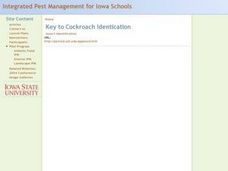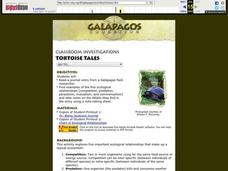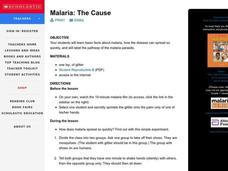Curated OER
Parasite Development and Life Cycle
If you are new to teaching agriculture classes, this outline may be helpful when you are preparing a lecture on parasites in livestock. In addition to lecturing on this topic, the lesson plan suggests that learners research the life...
Curated OER
Deformed Frogs! - The Parasite Hypothesis
This project provides young scholars the opportunity to investigate parasites as a possible cause of the observed frog deformities. It asks students to view web-based evidence and interpret whether it supports the parasite hypothesis....
Curated OER
Parasites and You
Twelfth graders investigate parasites and how parasite-borne diseases are spread. They conduct Internet research, answer handout questions, and identify methods that could reduce parasitic diseases in various countries.
Curated OER
Friend, Foe, or . . .
As a result of this lesson, upper elementary ocean explorers will be able to describe several interrelationships: symbiosis, mutualism, commensalism, and parasitism. They learn that the biological richness is increased near seamounts and...
Curated OER
Fish Parasite Survey
Learners survey and dissect as many fish as possible. They count nematodes, cestodes and crustaceans on the fish, fill out autopsy reports, and transfer data to a chalkboard data table. Students graph the results of the entire class...
Curated OER
Invisible Enemy
Students investigate parasites and the diseases they can cause and carry. They read and discuss an article, conduct research, and create a fictional studenT story about the parasite they researched.
Curated OER
Animated Video Productions - Life Cycles
Seventh graders compare/contrast the life cycles of free-living organisms to that of parasites. They conduct Internet research, illustrate the stages of a specific organisms's life cycle, and direct and produce a mini-video production.
Curated OER
Symbiosis: Help, Hinder or Destroy
Use background information and vocabulary to familiarize your students with the concept of symbiosis and the role agriculture plays in the shared relationship. They then write the vocabulary in their lab books or journals, and read the...
American Museum of Natural History
What's This? Leeches
Who actually likes leeches? Meet a scientist that makes his living letting leeches feed on him. Pupils learn about the characteristics of leeches and different variations of the species. The lesson works as a remote learning resource or...
Curated OER
Nitrogen Fixation, OR What a Gas!
Young scholars gain skill in the design, implementation, and reporting of a scientific research project using the scientific method. They set up an experiment to determine the effect of adding the Rhizobium bacteria to one group of...
Curated OER
The Disappearing Honeybees: Tracking Honeybee Decline
Middle schoolers practice graphing and other math skills to track number of honeybee colonies present in United States since 1978, discuss major crops that are dependent on insect pollinators, and examine reasons for decline of United...
Curated OER
Oysters Are Habit Forming!
Students examine the relationships within a salt marsh habitat. In this habitat lesson, students examine the various kinds of symbiotic relationships in a salt marsh habitat.
Curated OER
Smallest Thing
Young scholars compare characteristics of myobacteria and viruses to determine which is the smallest life form. They read and discuss an article that presents different viewpoints on the definition of life to determine their own viewpoint.
Curated OER
Classy
Students explore the classification system in this seven lessons unit. The diversity of life forms and their characteristics are examined using a microscope. Kingdoms, classes, and families are investigated.
Centers for Disease Control and Prevention
Learning about Giardia and Giardiasis - Research and Role Play
Young biologists begin researching giardia and completing an epidemiologic triangle. They then portray either a parent of a sick child or a physician in a fun role play activity.
Curated OER
Symbiotic Strategies
Students explore the different interspecies relationships namely mutualistic, commensal and parasitic. In this ecology activity, students investigate an ecosystem disrupted by humans. They formulate an action plan to save it and present...
Children’s Hospital of Philadelphia
Understanding How Diseases Spread
To boost disease prevention, high schoolers arm themselves with information about infectious diseases and how they spread. Scholars research the causes, prevention techniques, and identify high-risk groups especially vulnerable to a...
Curated OER
How Clean Is Our Water?
Students examine samples of water to determine its cleanliness. They visit a waste treatment plant and/or reservoir. Students explore what protects the water supply from contamination by chemical or organize pollution. They trace the...
Curated OER
Environment: Insects and Pesticides
Students classify bugs as pest or non-pests and identify ways to control them. They also examine the three levels of pesticides by reading the labels. Students complete charts of signal words on pesticide labels.
Curated OER
Tortoise Tales
Students read journal entry from a Gal??pagos field researcher, find examples of five ecological relationships (competition, predation, parasitism, mutualism, and commensalism) and take notes on the details they find in the entry using a...
Curated OER
Choose Your Defense: Spines, Vomit and Camouflage
Students investigate defensive mechanisms of insects and organisms. In this biology lesson, students draw imaginary caterpillars as well as imaginary parasites that will harm the caterpillar. Students utilize the Internet to discover...
Curated OER
When Germs Attack!
Students explore the hidden world of microbes and how our bodies spring into action in response to diseases. This ten lesson unit presents data on several microbial diseases and the reaction of the body's immune system.
Curated OER
Malaria: The Cause
Students explore the basic facts about malaria. They study how the disease can spread so quickly and label the pathway of the malaria parasite.
Centers for Disease Control and Prevention
Teach Mrs. Jones' Class about Microbes
During a biology lesson, scholars research microbes, design a lesson plan using an outline, and present the lesson to the class.
Other popular searches
- Mutualism Parasitism
- Brood Parasitism
- Symbiosis Parasitism
- Parasitism Activity
- Ecology Parasitism
- Mutual Ism Parasitism
- Parasitism Activity Puzzle
- Mutualism, Parasitism
- Mutual Ism, Parasitism

























